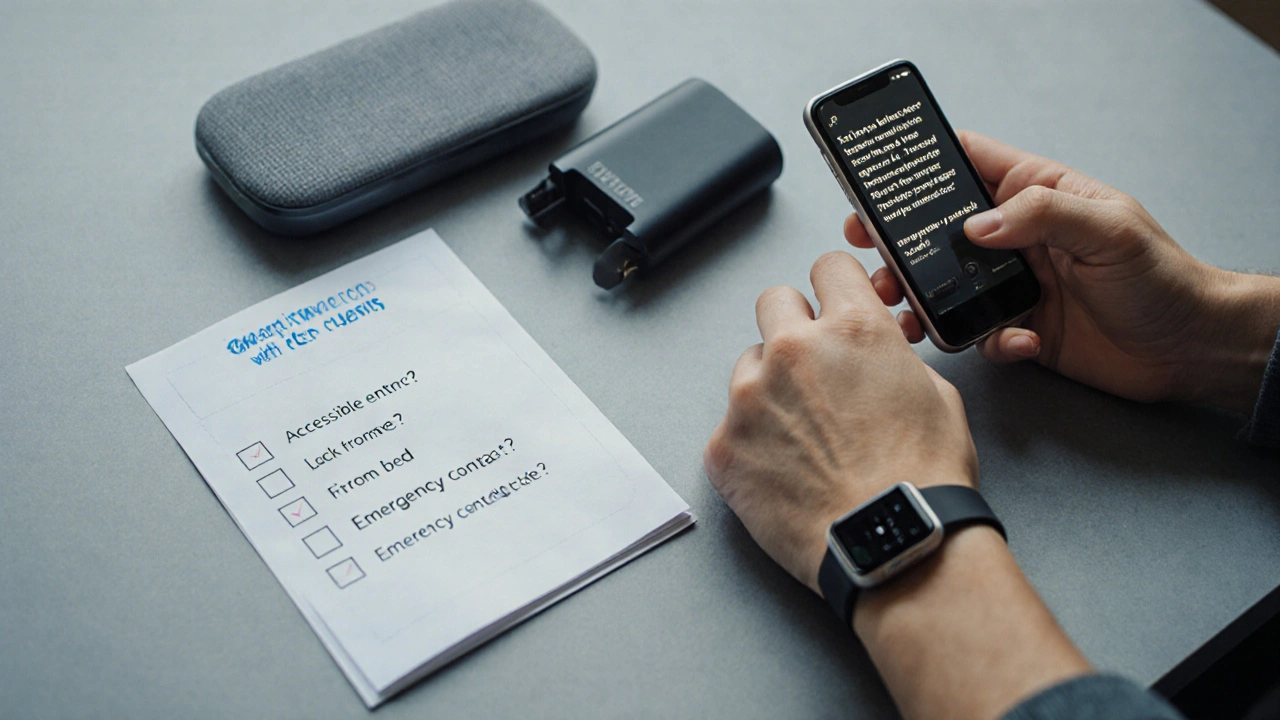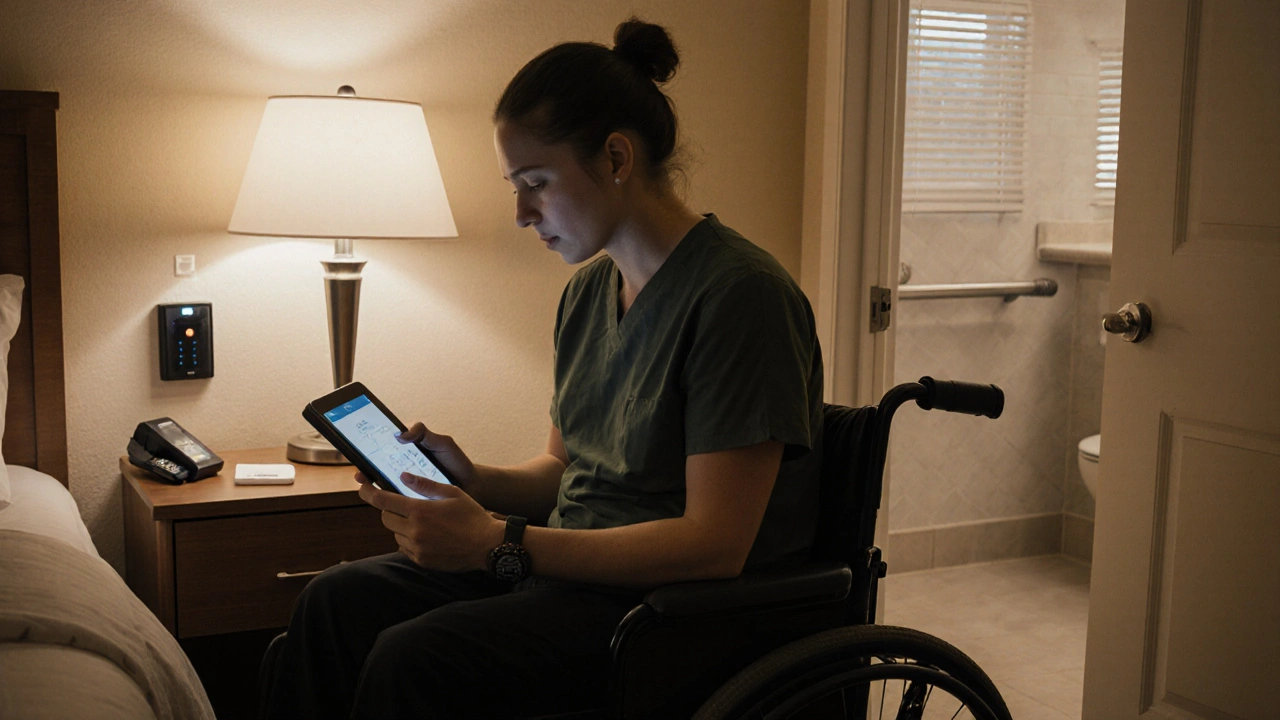Being a sex worker with a disability doesn’t mean you have to take more risks than anyone else-but it does mean you need to plan differently. Many safety guides assume everyone moves the same way, communicates the same way, or can escape a situation quickly. That’s not true for everyone. If you use a wheelchair, have chronic pain, are deaf or hard of hearing, live with neurodivergence, or manage any other disability, your safety plan needs to match your body and needs. This isn’t about pity. It’s about practicality.
Know Your Limits Before You Agree to a Job
You don’t have to do anything that could hurt you. That includes physical strain, emotional overload, or situations where you can’t call for help. If a client asks for something that requires standing for an hour, crawling, or being in a space with no accessible entrance, say no. No guilt. No apology. Your body is not negotiable.Some disabled sex workers use a checklist before accepting bookings: Can I get in and out of the location safely? Is there a way to lock the door from the inside without needing to stand? Can I communicate clearly if I’m nonverbal or use AAC? If the answer to any of these is no, walk away. Clients who respect you will understand. Those who don’t? They’re not worth the risk.
Accessibility Isn’t Optional-It’s Part of Safety
A hotel room with a step at the entrance isn’t just inconvenient-it’s dangerous. A bathroom without grab bars can turn a routine visit into a fall risk. If you’re working from home, make sure your space is set up so you don’t need help to lock doors, reach your phone, or trigger an emergency alert. If you’re meeting clients elsewhere, ask for photos of the entrance, bathroom, and bedroom before agreeing to anything.Some disabled sex workers use video calls to screen locations before meeting in person. Others work with trusted peers to do walk-throughs. If you use a mobility aid, check that ramps are wide enough, thresholds aren’t raised, and furniture won’t block your path. Even small things like a loose rug or a dark hallway can become a hazard when you’re in a vulnerable position.
Communication Tools That Keep You Safe
If you’re deaf or hard of hearing, don’t rely on hearing a knock or a voice change to know someone’s approaching. Install visual doorbells with flashing lights. Use smart home devices that send alerts to your phone when motion is detected. If you’re nonverbal or use a speech device, have a pre-written script ready to share with clients: “I use a communication app. I’m clear about boundaries. Please respect them.”For those with cognitive disabilities or PTSD, having a simple safety phrase like “I need a break” or “I’m not feeling well” can be a lifeline. Practice saying it out loud. Record it on your phone. Write it on a card. Clients who are respectful will pause. Those who push? Block them. Immediately.
Emergency Plans That Actually Work for You
Standard safety apps like Circle of 6 or SafeTrek assume you can tap your phone quickly, run to a safe place, or shout for help. That’s not always possible. So adapt.Some disabled sex workers use voice-activated assistants like Siri or Google Assistant to send pre-recorded emergency messages: “I’m in danger. Call [name].” Others set up automated alerts that trigger if their phone stops moving for 10 minutes. If you use a power wheelchair, keep a backup battery and a portable charger in your bag. If you have seizures or sudden mobility loss, tell a trusted friend your schedule and ask them to check in at a set time.
One sex worker in Melbourne uses a wearable panic button that connects to a 24/7 response team. When pressed, it sends her location, medical info, and a live audio feed. It costs $80 a month-but she says it’s the only thing that gives her peace of mind.

Building a Support Network You Can Rely On
You don’t have to do this alone. Many disabled sex workers form peer networks-small groups that check in daily, share location updates, or show up if something feels off. These aren’t formal organizations. They’re just people who get it.Find others through online forums like Disabled Sex Workers United or local disability advocacy groups. If you’re in Australia, groups like People With Disability Australia can connect you with others who’ve navigated similar challenges. You don’t need to disclose your work to join-just say you’re looking for safety strategies.
Having someone you can text “I’m not okay” and know they’ll call the police or come over is worth more than any app. Make sure at least one person in your network knows your routine, your vehicle details, and how to access your emergency contacts.
Legal and Financial Protection
If you’re on government support, you might worry that sex work will affect your benefits. In Australia, sex work is legal in most states, but rules vary. In Western Australia, where you’re based, it’s decriminalized-but income reporting can be tricky. Talk to a legal aid service like the Women’s Legal Service WA. They’ve helped disabled sex workers navigate Centrelink without losing access to disability support.Set up a separate bank account for work income. Use apps like Mint or YNAB to track earnings without mixing them with your disability payments. Keep receipts for anything related to your work-mobility equipment, safety gear, transportation. These can be claimed as business expenses if you ever need to prove income.
Dealing with Stigma and Assumptions
People assume disabled sex workers are vulnerable, helpless, or “exploited.” That’s not your story. You’re making choices. You’re managing risks. You’re surviving-and thriving-on your own terms.When clients or even other sex workers make assumptions-“You must be so brave,” “I couldn’t do that,” “Are you sure you’re safe?”-you don’t owe them explanations. A simple “I’ve got this” or “My safety plan works for me” is enough. You don’t need to justify your existence to anyone.
And if someone tries to use your disability as a reason to control you-demanding you work in unsafe conditions, refusing to pay, or acting like you’re “lucky” they’re even interested-that’s abuse. It’s not sex work. It’s exploitation. And you have every right to report it.
Tools and Resources That Actually Help
Here’s what works for real disabled sex workers:- Adaptive safety gear: Door stoppers with suction cups, portable door locks, voice-activated lights.
- Communication apps: Proloquo2Go, TouchChat, or even simple text-to-speech tools on your phone.
- Emergency devices: Medical alert pendants with GPS, smartwatches with fall detection.
- Transportation: Accessible ride-share options like UberWAV or local disability transport services.
- Online communities: Disabled Sex Workers United (Facebook group), Sex Workers Outreach Project (SWOP) chapters with disability liaisons.
None of these are luxury items. They’re survival tools. If you can’t afford them, reach out to disability organizations. Many have grants or loan programs for safety equipment.
You Deserve Safety-Not Just Survival
Sex work with a disability isn’t about overcoming limitations. It’s about designing a life that works for you. That means saying no to unsafe clients. It means insisting on accessible spaces. It means having a plan that doesn’t rely on running, shouting, or being “strong.”You’re not broken. You’re not a burden. You’re a sex worker who deserves the same respect, control, and safety as anyone else. The system wasn’t built for you. So build your own.
Can I still be safe as a disabled sex worker if I can’t move quickly?
Yes. Speed isn’t the only path to safety. Use tools like voice-activated alerts, pre-set emergency contacts, visual doorbells, and wearable panic buttons. Many disabled sex workers rely on remote check-ins with trusted peers or automated location-sharing apps that trigger if there’s no movement for a set time. Your safety plan doesn’t need to match able-bodied norms-it needs to match your body.
What if a client refuses to accommodate my accessibility needs?
Walk away. No exceptions. If a client won’t meet you in an accessible space, won’t allow you to use your communication device, or tries to pressure you into unsafe positions, they’re not a client-they’re a risk. Your boundaries aren’t negotiable. You have the right to choose where and how you work. Clients who respect you will adapt. Those who don’t? Block them and move on.
Is it legal to use safety tech like GPS trackers or panic buttons while working?
Yes. In Australia, using GPS trackers, emergency alert devices, or recording equipment for personal safety is legal as long as you’re not recording clients without their knowledge in private spaces. Always inform clients upfront if you’re using a safety app that shares location or audio. Transparency builds trust and protects you legally. Many disabled sex workers use devices like the LifeAlert or Apple Watch fall detection features-these are widely accepted as personal safety tools.
How do I find other disabled sex workers for support?
Start with online groups like Disabled Sex Workers United on Facebook or the SWOP (Sex Workers Outreach Project) disability network. Local disability advocacy organizations in Perth, like People With Disability Australia, can also connect you with peers. You don’t need to disclose your work to join these groups-many members are just looking for safety strategies. Building a peer network is one of the most effective ways to stay safe.
Can I get financial help for safety equipment?
Yes. In Australia, some NDIS plans cover safety equipment if it’s linked to your disability needs. Items like grab bars, door locks, or communication devices can sometimes be approved as “home modifications” or “assistive technology.” If you’re not on NDIS, check with local disability services or charities-they often have small grants for safety gear. Even $100 for a portable door alarm can make a huge difference.
Next Steps: Build Your Personal Safety Plan
Start small. Pick one thing you can improve this week. Maybe it’s installing a visual doorbell. Maybe it’s texting a friend your schedule every day. Maybe it’s writing down your top three non-negotiable boundaries and keeping them on your phone.There’s no perfect plan. There’s only a plan that works for you. And you’re already doing the hard part-you’re thinking about safety. That means you’re already ahead.
